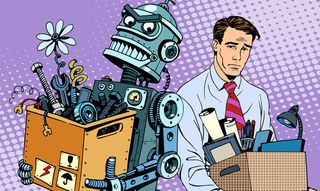
AI staff in the workplace could lead to human redundancies, but could also force people to become better at their jobs.
This is according to technology law firm Kemp Little, which warned that robots will replace HR staff as workforces become more automated.
"The role of HR is going to be significantly less than it has been," said Kathryn Dooks, employment partner at Kemp Little.
AI systems will be capable of performing many of HR's day-to-day tasks, such as updating staff records and noting and circulating holiday requests, she said.
Citing Amazon's introduction of Kiva robots at its distribution centres to replace staff unhappy about having to walk miles each day to fulfill product orders, Dooks added that with a robot workforce, there are "far fewer employee relations issues and therefore less need for HR managers".
Some studies have predicted a rise in unemployment as AI gets more advanced, including a 2015 study by Oxford University and Deloitte, published by the BBC, said 35 per cent of UK jobs will be at high risk from automation over the next 20 years.
However, Dooks was doubtful that AI would lead to mass unemployment, pointing back to the Industrial Revolution to claim that humans would instead become more skilled workers.
Get the ITPro. daily newsletter
Receive our latest news, industry updates, featured resources and more. Sign up today to receive our FREE report on AI cyber crime & security - newly updated for 2024.
"In the Industrial Revolution, and introduction of the spinning jenny, that didn't lead to mass unemployment. It just led to a change in the way that we approach roles, and led to us being much more sophisticated," she said.
"There may be a role for HR and business to play in what the workforce looks like in terms of up-skilling staff. Learning, development and investment in staff, and in your future workforces, is probably going to be key here."




